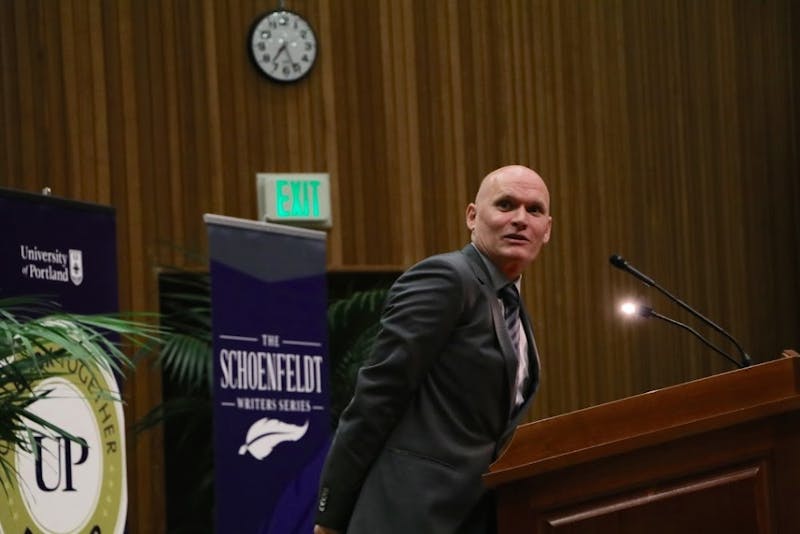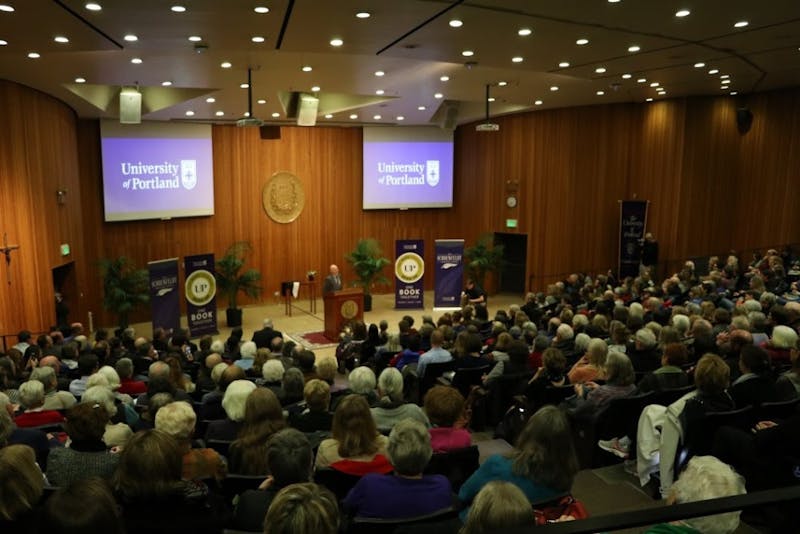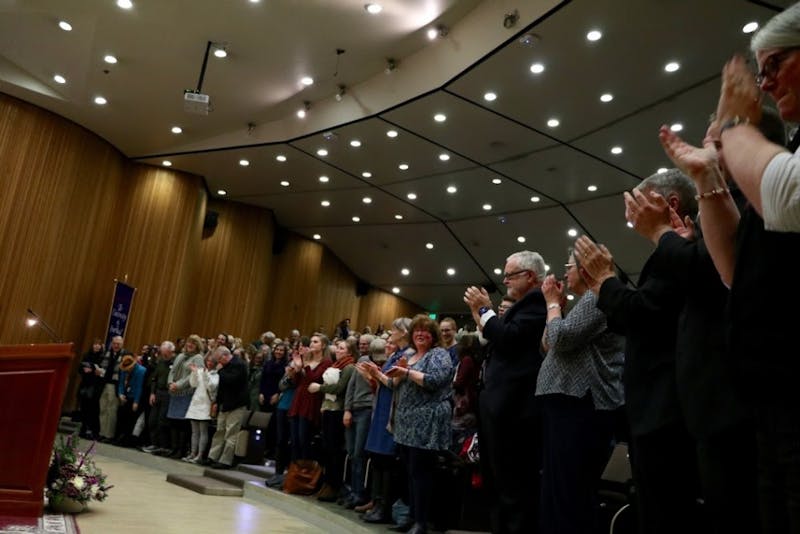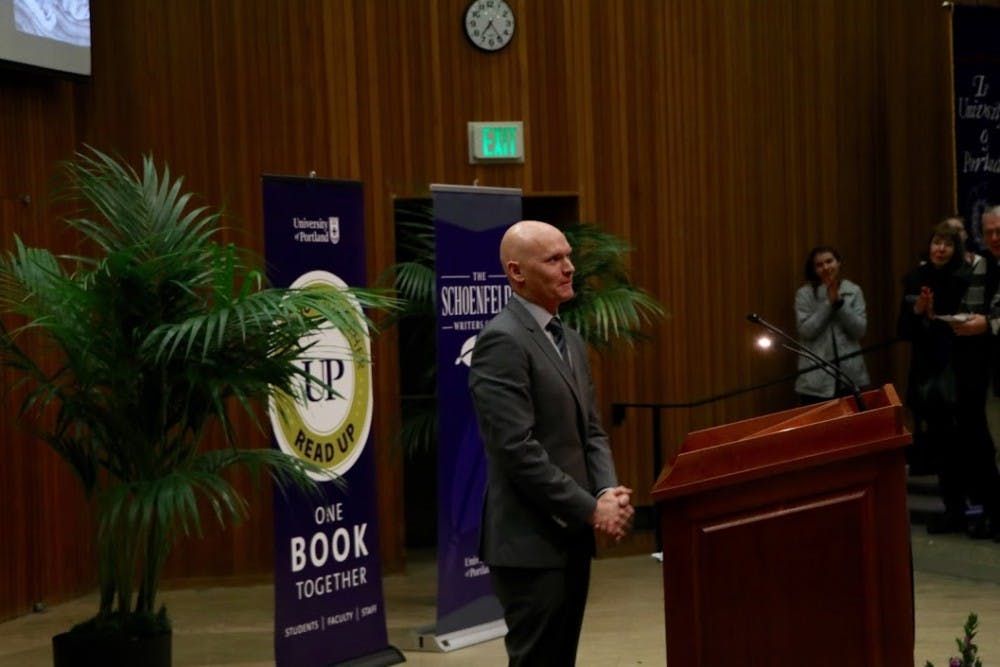On Monday night, UP students and members of the Portland community packed the Buckley Center Auditorium — and several Buckley classrooms where the event was live-streamed — to hear from author Anthony Doerr.
Doerr is the author of UP’s ReadUP book of the year, the Pulitzer Prize-winning novel “All The Light We Cannot See.” Doerr received an honorary doctorate degree in humane letters from UP for exemplifying the mission of the University with his work. He opened the event by sending prayers and good thoughts to beloved UP author, Brian Doyle, who is on medical leave because of a brain tumor.
Over the hour and a half speech, Doerr was witty, contemplative and soulful as he spoke about his journey writing “All the Light We Cannot See,” and his appreciation for community and curiosity.
“All the Light We Cannot See,” published in 2014, is a novel highlighting characters on both sides of the World War II conflict, and their unlikely meeting and care for each other.

On researching to write “All the Light We Cannot See”
“In many ways, writing this novel was like hopping around the college course catalogue — trying to teach myself bits of French and German, trying to understand how military occupations work, how the Atlantic Wall was built. One day, I’d be trying to understand how bunkers were fortified, and in the next minute I’d be trying to understand what kind of meals a house in Brittany might have cooked with ration tickets in 1943.”
On his hope for the reader’s experience
“The paths of the largest questions runs through the smallest particulars. Any journey through the universal runs through the individual. I wanted my reader to re-see things we take for granted, things that become so familiar to us that we no longer see them clearly. I wanted to remind myself and the reader that even the simple act of seeing can be miraculous and strange if we look at the world with new eyes.”
On the current political and social climate
“A little over 30 days ago, although for some of us it might seem like 30 years, we inaugurated a new president. Though I don’t believe America is the scene of carnage that our president describes, it’s not hard to observe that he has come to power at an alarming time.
Last year was the warmest year in the 137 years that the (National Oceanic and Atmospheric Association) has been reporting surface temperatures, the third straight year that the global annual surface record has been broken, climate refugees are on the move on every continent, manufacturing jobs that use to offer the American workers decades of stability are now often executed oversees or by machines, high school diplomas are no longer adequate tickets to steady employment. According to an article I read last week, half of the men who have dropped out of the workforce now take pain medication on a daily basis.”
On how to face troubling times
“Who can blame some of us from becoming distrustful and anxious? Who hasn’t had the urge to lock the door and climb into a womb of Netflix and pull a figurative Brexit from the world?
Unfortunately, a dream of isolating ourselves is just that — a dream. One that is no longer practical or possible. The truth is that, in 2017, the more we can remember how interconnected we all are, the more we can train ourselves to empathize with the children in our neighborhoods, beyond our borders and in our future, the better off we’ll be. There are one thousand ways to remind ourselves of that interdependence — we can get to know our police officers, we can shovel our neighbor’s driveways, we can serve people less privileged than us, we can attend an event like this, we can travel, we can paint, we can ask questions of the guys who will serve you breakfast at the dining hall tomorrow morning.”

On Doerr’s favorite novels
“The lesson of every single one of my favorite novels is this: The truth is more complicated than I thought.”
On reading and writing stories
“Reading and writing stories is not, despite appearances, about spending a lot of time by yourself. It’s about learning to be able to look beyond yourself, beyond the ego, to enter other lives and other worlds. It’s about honing your sense of empathy so a story might bridge the gap between the personal and the communal. If you find the right book, you can breach the walls of your skull and transcend the barriers of culture, class, race and time.
If you keep relearning the lesson that no one is normal, no one is usual or ordinary, when you need it most, your imagination will be nimble and muscular and ready, capable of airlifting you out of yourself and dropping you into the life of whomever you choose.”
On the importance of imagination
“I’m not the first person to suggest that your imagination is a muscle: the more you work it out, the stronger it will get. In the months and years to come, we’re going to need all of our imaginations more than ever.
As Bryan Doyle puts it, ‘We’re going to need to use our heads for dreaming.’ I hope it’s not too bold to suggest that through novels, short stories and poems we can expand our imaginations, combat unilateralism and stereotype, and deepen our experiences in life, and even increase important ways nudge the world toward goodness.”
On what it takes to keep a 10-year book project going
“Insanity, is what it takes. It’s easy once you’ve finished a project like that to look back and think, ‘Oh, it was all worth it,’ but you never really know if you’re capable of finishing something while you’re working on it, or if it’s going to cave in… In the end, because you’re changing and evolving as a person, you need some central fascination that never wanes.
For me, it was a love of radio. Growing up in Cleveland, bedtime was before the end of a lot of Redskins games, and I built this little radio, and I would listen to the games under my covers. It was a kind of reading. Hearing the voice of someone in Kansas City narrating this story, it was a kind of magic. I was tapping into something I cared about from my youth, and somehow that carries you through.”
On writing from the perspective of his character Marie Laure, a blind girl
“I was challenging myself to see if I could write from different points of view where the character had some disability that deprived him or her of one sense. In one of the first short stories I published, called ‘The Shell Collector,’ the character was visually impaired, and I’ve always been interested in seeing how I could deliver the world to the reader through channels that the reader isn’t as used to seeing.”

On keeping his sense of wonder
“You just have to go outside. You just have to stop for a minute and look around. I’m sure, for those who work here, these trees have become something you just pass, but take a moment and just breathe and look at these things that are older than you are.”
On how ordinary people can make good choices at a time when “It’s not easy to be good”
“I think it’s really important to ask yourself, what are you ratifying by your silence? Will my great grandchildren think I was a terrible person for flying on airplanes a lot? Will I contribute to a much harsher quality of life for them? I sometimes think that when I get to the gate of heaven, they’re just going to dump all the single use plastics on my head…
I pay my taxes, and yet there are drone strikes happening that I don’t necessarily think we need to be doing. Do I ratify them with my own silence? But, at the same time, you can’t carry all these burdens all the time. Maybe it’s most important to be kind locally, be kind in your neighborhood, be kind to the people you’re walking past. Take a moment to imagine the life of whoever is checking out your groceries, or how blessed you are to be able to afford your groceries.”
On which book you should read next
“Go read ‘Virginia Woolf,’ or something that’s stood the test of time.”








